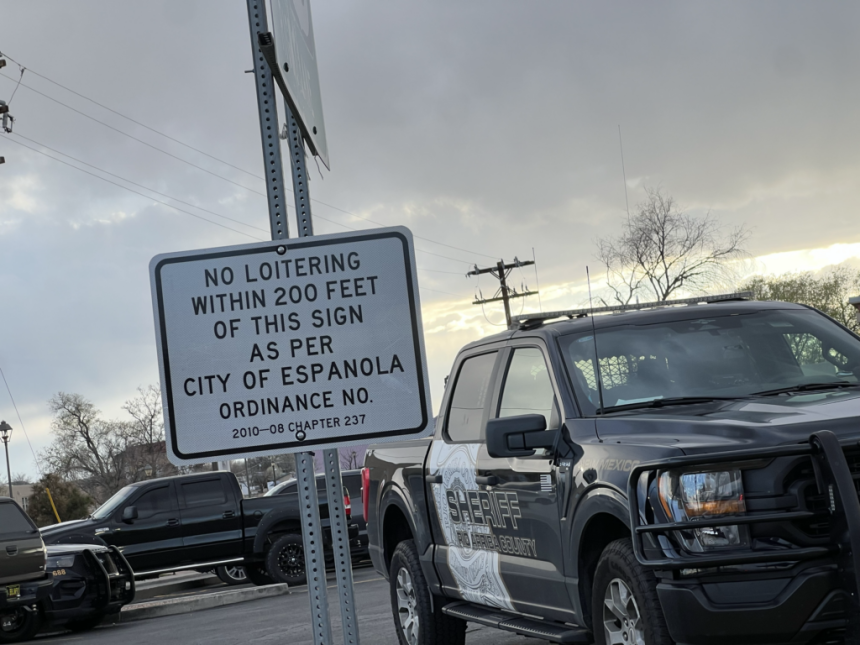A Rio Arriba County Sheriff’s Office vehicle sits in front of a “no loitering” sign in Española last April. Gov. Michelle Lujan Grisham on Wednesday announced an emergency declaration aimed at dealing with rising crime in the small northern New Mexico town. (Photo by Patrick Lohmann / Source NM)
Gov. Michelle Lujan Grisham issued an emergency declaration for the small city of Española and the surrounding area Wednesday, saying local police are overwhelmed with rising crime and drug overdose deaths. In an executive order, the governor authorized state resources, including the National Guard, to help after city, county and Pueblo leaders requested the assistance.
According to the executive order, police calls in Española and surrounding areas have doubled in the last two years, and police dispatches to businesses have quadrupled in that same period. She also cited Rio Arriba County’s high overdose death rate, “with residents struggling with addiction to fentanyl and other illicit substances.” Lujan Grisham’s order also authorized $750,000 in emergency spending.
“When our local leaders called for help to protect their communities, we responded immediately with decisive action,” Lujan Grisham said in a news release announcing the executive order. “We are making every resource available to support our local partners on the ground and restore public safety and stability to these areas that have been hardest hit by this crisis.”
Lauren Thorp, a spokesperson for the governor’s office, told Source NM the order is meant to help local, county and tribal police pay for “officer overtime, public safety equipment, and multi-agency interventions to address the surge in violent crime and drug trafficking.”
“This coordinated approach addresses the interconnected challenges of crime, overdoses, and community instability that have strained local capacity beyond their limits,” Thorp said in an email.
There is no “immediate” assignment to deploy the National Guard, Thorp said, but that standard language in the governor’s executive order “is there if needed.”
Guard spokesperson Hank Minitrez also confirmed that. “Guard hasn’t been tasked with any mission,” he said in a text message.
The governor signed a similar executive order in April that authorized National Guard troops to assist law enforcement in Albuquerque, the state’s biggest city. The governor’s April declaration in Albuquerque drew denunciations from the American Civil Liberties Union of New Mexico.
In that order, she also authorized $750,000 in emergency spending because she said Albuquerque was “experiencing a significant increase in crime” and requested help because it, too, did not have adequate resources to respond.
But unlike the Albuquerque executive order that directed the emergency funding directly to the National Guard, the Española order directs the funds to the state Department of Homeland Security and Emergency Management, an agency that typically helps residents respond to wildfires, floods or other natural disasters.
Thorp provided Source recent letters from the Santa Clara and Ohkay Owingeh pueblos, along with Española and Rio Arriba County officials, asking the state to assist. She also forwarded along a series of charts from the Española Social Services Department director, Michelle Fraire, who said that the city has already seen 49 overdoses, compared with 40 in all of 2024.
“I predict this number will continue to increase and more than double,” Fraire wrote, according to the materials the governor’s office provided.
Danielle Silva, a spokesperson for Homeland Security, told Source that the department is receiving the funding to coordinate various state agencies, like it does after a natural disaster, to assist local officials dealing with the increased crime.
“We’re kind of dealing with the state as a whole trying to figure out a multi-faceted response,” she said. “The details on that need to be fleshed out with the locals, but they asked for help so we’ll figure out how to do it.”
Silva said “housing and other public safety” are examples of how the state’s various agencies might be able to assist the communities.
Española Police Chief Mizel Garcia told Source the reason why the city asked for help is because it doesn’t have enough police officers to respond to a spike in crimes committed by young people and crimes involving guns.
“We lose a lot of officers to bigger agencies that pay more and offer more benefits,” Garcia said in an interview. “The issue for us is the availability of resources.”
The city of just over 10,000 people cannot generate as much in tax revenue as larger cities, he said.
Española borders the Pueblos of Ohkay Owingeh to the north and Santa Clara to the south, which the order says are also experiencing “a significant increase in crime.”
Garcia said it is premature to say what the funding will be used for, and that will be determined once his agency can have a meeting with the Rio Arriba County Sheriff’s Office and the Ohkay Owingeh and Santa Clara tribal police departments to develop a plan of action.
“Many parts within the city of Española are within the jurisdiction of our tribal agencies, so this isn’t just for my department, this is something that’s joint,” Garcia said. Including the New Mexico State Police, there are five different police agencies that can respond to calls in the city, he said.
Española officials said at a town hall meeting on crime and organized by the governor last summer that they were having trouble recruiting local police officers, given that Los Alamos National Laboratories offered similar candidates much higher pay.
At the same town hall, residents were divided about what the city should do about an unhoused encampment that grew alongside the Rio Grande in town. City officials cleared the encampment shortly after the meeting, drawing an outcry.
In the Albuquerque executive order, the governor authorized up to 70 National Guard soldiers to arrive in the city of about 560,000. They were dressed in plain clothes and were instructed to help APD with “non-law enforcement” activities including traffic control, administrative duties, transporting incarcerated people, court security, emergency response and “other critical functions that allow local law enforcement to focus on crime reduction efforts.”
The National Guard remains in Albuquerque, since the governor reauthorized its presence. The state has spent at least $2 million to keep it there.









